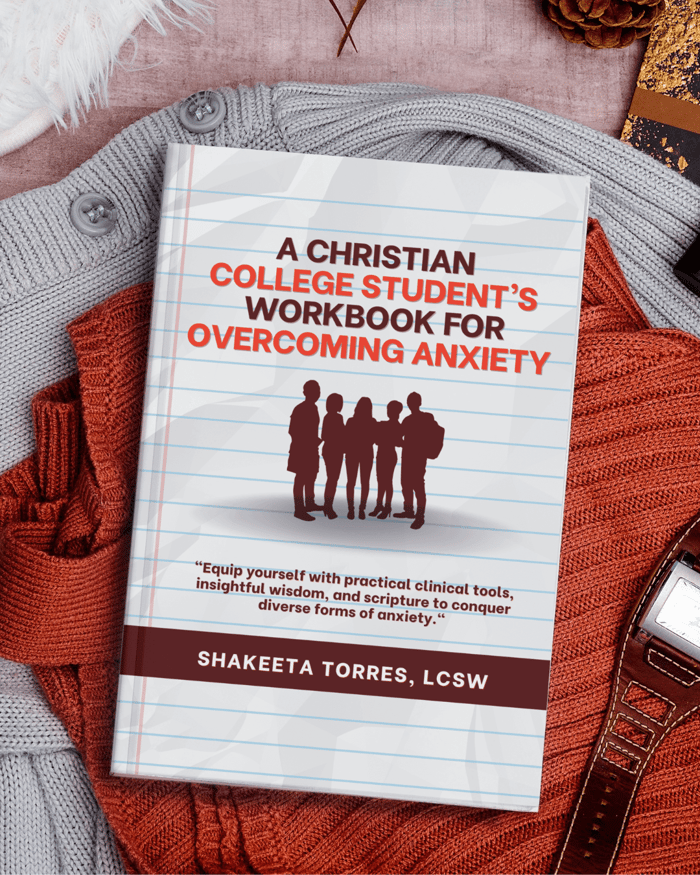Table of Contents
- Ten Causes of Anxiety Among Christian College Students (And How to Overcome Them)
- 1. Academic Pressure
- 2. Social Expectations & Peer Pressure
- 3. Faith and Identity Struggles
- 4. Financial Stress
- 5. Transitioning to Adulthood
- 6. Career Uncertainty and God’s Calling
- 7. Relationships & Dating Pressure
- 8. Mental Health Stigma in Christian Communities
- 9. Spiritual Growth Expectations
- 10. Balancing Community Involvement and Responsibilities
- Breaking the Cycle of Anxiety in Christian Colleges
- FAQs
Ten Causes of Anxiety Among Christian College Students (And How to Overcome Them)
Ten Causes of Anxiety Among Christian College Students (And How to Overcome Them)
 College is often seen as a season of adventure, growth, and self-discovery. For Christian students, it can also be a time of deepening faith and forming lifelong relationships. However, this exciting journey is not without its challenges. Anxiety is a common struggle for many college students, and Christian students often face unique stressors that can impact their mental health and spiritual well-being.
College is often seen as a season of adventure, growth, and self-discovery. For Christian students, it can also be a time of deepening faith and forming lifelong relationships. However, this exciting journey is not without its challenges. Anxiety is a common struggle for many college students, and Christian students often face unique stressors that can impact their mental health and spiritual well-being.
Understanding the root causes of anxiety can help students navigate these challenges with resilience, faith, and confidence. Below are ten common causes of anxiety among Christian college students, along with insights on how to manage them.
1. Academic Pressure
The demand for academic excellence is one of the most significant stressors for college students. Christian students, in particular, may feel pressure to excel to honor God and fulfill their calling. The weight of exams, research papers, and deadlines can lead to overwhelming stress, sleepless nights, and anxiety over failure.
How to Overcome Academic Pressure:
• Time Management: Use planners and digital tools to organize assignments and deadlines.
• Seek Support: Join study groups, attend tutoring sessions, and ask professors for guidance.
• Trust God’s Plan: Remember that your worth is not solely based on academic performance (Colossians 3:23).
2. Social Expectations & Peer Pressure
Forming friendships, fitting in, and maintaining relationships while staying true to Christian values can be challenging. Many Christian students feel torn between social acceptance and their commitment to their faith. Fear of judgment, rejection, or isolation can lead to social anxiety.
How to Overcome Social Anxiety:
• Choose Your Community Wisely: Surround yourself with friends who respect your beliefs.
• Set Boundaries: Be confident in avoiding activities that compromise your faith.
• Find a Christian Fellowship: Join campus ministries or Christian student organizations for support.
3. Faith and Identity Struggles
Balancing faith with academic learning can be difficult, especially when encountering secular worldviews that challenge personal beliefs. Some Christian students may struggle with doubts, feel pressured to conform, or worry about how to apply their faith in real-world settings.
• Seek Mentorship: Connect with Christian professors, pastors, or campus chaplains.
• Stay Rooted in Scripture: Regularly study to strengthen your faith.
• Find Like-Minded Believers: Engage with a faith-based community for encouragement and discussion.
4. Financial Stress
The cost of tuition, textbooks, housing, and daily expenses can create financial anxiety. Some Christian students also feel a sense of guilt for burdening their families with financial struggles or taking on student loans.
How to Overcome Financial Anxiety:
• Create a Budget: Track income and expenses to avoid unnecessary financial stress.
• Apply for Scholarships & Grants: Research financial aid options for Christian students.
• Trust God’s Provision: Remember Philippians 4:19—God will supply your needs.
5. Transitioning to Adulthood
College represents a significant transition from dependence to independence. Managing responsibilities such as time management, cooking, paying bills, and making major life decisions can feel overwhelming. Many Christian students also feel the weight of making choices that align with their faith.
How to Overcome the Anxiety of Adulthood:
• Develop Life Skills: Take small steps in learning financial literacy, cooking, and time management.
• Seek Wise Counsel: Proverbs 15:22 encourages seeking guidance from mentors and advisors.
• Give Yourself Grace: Transitioning into adulthood is a learning process—mistakes are part of growth.
6. Career Uncertainty and God’s Calling
Many Christian students experience anxiety over their future careers. They may struggle with questions such as: “What is God’s purpose for my life?” or “Am I choosing the right major?” The fear of making the wrong decision can be paralyzing.
How to Overcome Career Anxiety:
• Pray for Guidance: Trust in Proverbs 3:5- 6—seek God in all your decisions.
• Gain Experience: Explore internships, volunteer work, and career counseling.
• Remember That God Uses All Paths: Sometimes, your career journey will not be a straight line, but God is always working through it.
7. Relationships & Dating Pressure
Romantic relationships can be a source of anxiety for Christian college students. There is often pressure to find a future spouse while navigating purity, biblical values, and personal emotions. The fear of making mistakes or engaging in relationships outside God’s will can be stressful.
How to Overcome Dating Anxiety:
• Seek God’s Timing: Matthew 6:33 reminds us to seek God first.
• Set Clear Boundaries: Have open conversations about faith and expectations in relationships.
• Trust in God’s Plan: Marriage is not a race; trust God’s perfect timing.
8. Mental Health Stigma in Christian Communities
Although mental health awareness is improving, some Christian students still face stigma when struggling with anxiety or depression. They may fear that seeking counseling will be seen as a lack of faith or spiritual weakness.
How to Overcome the Stigma of Mental Health in the Church:
• Normalize Seeking Help: Therapy and faith coexist—mental health professionals can provide God-honoring support.
• Educate Your Community: Encourage open discussions about mental health in Christian groups.
• Pray & Take Action: Seeking help is not a lack of faith but an act of stewardship over your mind and body.
9. Spiritual Growth Expectations
Many Christian students feel pressure to achieve rapid spiritual growth during college. They may worry about not being “spiritual enough” or failing to meet certain expectations within their faith communities.
How to Overcome Spiritual Growth Anxiety:
• Focus on Your Personal Walk: Everyone’s spiritual journey is unique—growth takes time.
• Engage in Authentic Worship: Worship, prayer, and Bible study should be personal, not performative.
• Let Go of Perfectionism: God’s love is unconditional—spiritual growth is a journey, not a competition.
10. Balancing Community Involvement and Responsibilities
Being involved in Christian organizations, ministry, and outreach is fulfilling but can also be overwhelming. Christian students often struggle with burnout from balancing school, work, social life, and ministry.
How to Overcome Burnout Anxiety:
• Set Healthy Boundaries: Know when to say no—rest is biblical (Exodus 20:8-10).
• Prioritize Self-Care: Taking care of your mental, physical, and spiritual health is essential.
• Remember That Serving God is Not About Overworking: Jesus took time to rest—so should you!
Breaking the Cycle of Anxiety in Christian Colleges
Christian college students face unique challenges but do not have to navigate them alone. Institutions can help by:
✅ Offering counseling services tailored to Christian students
✅ Hosting mental health workshops with faith-based perspectives
✅ Creating spaces for open conversations about anxiety and faith
✅ Encouraging mentorship between students and faculty
Breaking the stigma surrounding mental health within Christian communities is essential. Encouraging open discussions, providing faith-integrated counseling services, and promoting self-care will help students develop resilience and confidence.
Resources to Help Christian College Students Manage Anxiety
As a therapist, I am passionate about supporting Christian students through the often stressful college journey. To help students overcome anxiety, I have created resources specifically for Christian college students:
📖 “Christian College Student Workbook to Overcome Anxiety” – A practical guide with assessments, coping strategies, and professional wisdom.
🙏 “Prayer Devotionals for Christian College Students” – A faith-based devotional for daily encouragement.
✍️ “Cast Your Cares on Jesus: A Journal for Christian College Students” – A guided journal for navigating college life with faith and peace.
College should be a time of growth, joy, and deepening faith. With the right tools, support, and mindset, Christian students can overcome anxiety and thrive academically and spiritually.
FAQs
1. Why do Christian college students experience anxiety, and how is it different from other students’ struggles?
Christian college students experience many of the same stressors as their peers, such as academic pressure, financial burdens, and social expectations. However, they also face unique challenges, including the pressure to integrate faith into their studies, discern God’s calling, and maintain spiritual growth while navigating secular environments. The tension between faith and real-world struggles can create added anxiety, especially when they feel they must always have strong faith despite their struggles.
Solution: Recognizing that faith and mental health challenges can coexist is key. Seeking support from faith-based counseling, mentors, and Christian community groups can help students navigate anxiety while remaining rooted in their faith.
2. How can Christian students manage academic pressure while staying grounded in faith?
Academic pressure can lead to stress and anxiety when students feel the need to perform perfectly. Many Christian students also struggle with balancing their studies and ministry involvement, often feeling guilty if one area takes precedence over another.
Solution:
• Set realistic goals and schedules for academic success and spiritual nourishment.
• Trust that God values effort over perfection (Colossians 3:23—“Whatever you do, work at it with all your heart, as working for the Lord”).
• Seek academic support through tutoring, study groups, and professors while prioritizing self-care and prayer.
3. What can Christian students do when they struggle with their faith in college?
College can be a time of faith-testing, especially in environments where Christian beliefs are challenged. Students may experience doubts and spiritual dryness or feel disconnected from God, which can lead to anxiety about their identity and purpose.
Solution:
• Engage in regular Bible study and prayer, even in small moments.
• Find a Christian community or campus ministry for encouragement.
• Remember that doubt does not mean a lack of faith—asking questions can strengthen spiritual growth.
• Seek mentorship from a pastor, professor, or spiritual advisor.
4. How can Christian college students overcome social anxiety and peer pressure?
The pressure to fit in, build friendships, and engage in social activities while maintaining Christian values can create anxiety. Some students may fear rejection for their beliefs or struggle with confidence in social settings.
Solution:
• Surround yourself with friends who respect and support your faith.
• Practice setting healthy boundaries in social situations.
• Join faith-based student organizations to find like-minded peers.
• Lean on God’s truth for confidence—2 Timothy 1:7 reminds us that God gives us a spirit of power, love, and self-discipline, not fear.
5. What mental health resources should Christian college students seek if they struggle with anxiety?
Many Christian students hesitate to seek mental health support due to stigma or concerns that relying on therapy means they lack faith. However, God cares about mental health, and seeking help is an act of wisdom.
Solution:
• Look for faith-based counseling services on campus or in the community.
• Utilize mental health resources such as books, journals, and devotionals that integrate faith and psychology.
• Engage in self-care practices like prayer, meditation, exercise, and journaling.
• Remember that mental health struggles do not indicate a weak faith—seeking help is biblical (Proverbs 11:14—“Where there is no guidance, a people falls, but in an abundance of counselors there is safety”).
Would you like these formatted into a downloadable FAQ sheet or social media content? 😊









